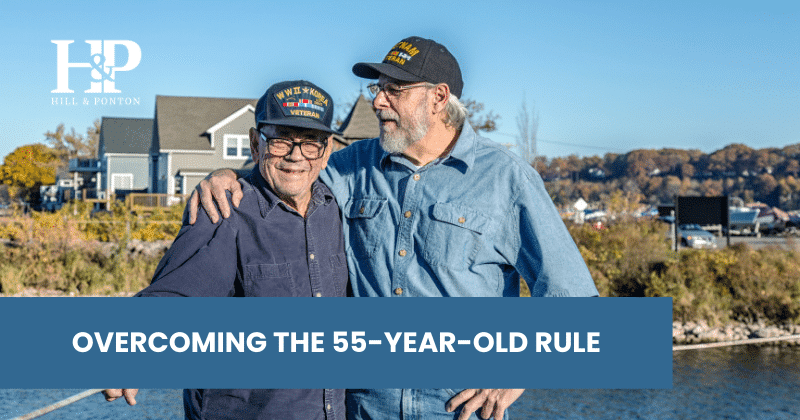As a veteran, you may be eligible for disability compensation from the Department of Veterans Affairs (VA) if you have a service-connected disability.
This compensation can help you cover the cost of medical treatment, living expenses, and other needs related to your disability.
However, many veterans are unaware that there are exceptions to the VA’s 55-year-old rule that can help them receive disability compensation even if they are over 55 years old.
In this blog post, we will explore the VA’s 55-year-old rule and its exceptions. We will discuss the types of disabilities that may qualify for compensation even if you are over 55 years old, and the steps you can take to apply for disability benefits.
We will also provide tips and resources to help you navigate the VA disability system and get the compensation you deserve.
Whether you are a veteran or a family member of a veteran, this post will provide valuable information to help you understand the VA disability system and your rights as a disabled veteran.
What is the VA’s 55-year-old rule?
The VA’s 55-year-old rule states that disability compensation will not be awarded for disabilities that first appear in a veteran after they turn 55 years old, unless the disability is due to military service.
This means that if you develop a disability after turning 55 that is not related to your military service, you may not be eligible for VA disability compensation. However, there are some exceptions to this rule that you should be aware of.
What are some of the exceptions to the 55-year rule?
Under the VA disability benefits program, veterans over the age of 55 are generally considered to have reached retirement age and may face additional hurdles in qualifying for benefits.
However, there are exceptions to the 55-year rule that may allow older veterans to still receive disability compensation. Here are a few examples:
- Individual Unemployability (IU): Veterans over 55 who are unable to work due to a service-connected disability may be eligible for IU benefits. This program provides veterans with compensation at the 100% disability rate, even if their actual disability rating is lower. To qualify, veterans must show that they are unable to maintain substantially gainful employment due to their service-connected disability.
- Presumptive Service Connection: Certain medical conditions, such as ALS (Lou Gehrig’s disease) and certain types of cancer, are considered to be presumptively connected to military service. This means that if a veteran develops one of these conditions after their service, the VA will assume that it is related to their military service and will provide disability compensation accordingly. There is no age limit for presumptive service connection.
- Special Monthly Compensation (SMC): SMC is a higher level of compensation that is available to veterans with severe disabilities, including loss of use of limbs, blindness, and certain types of mental illness. SMC is paid in addition to regular disability compensation, and there is no age limit for eligibility.
- Aid and Attendance (A&A): A&A is a benefit that provides additional financial assistance to veterans who require help with daily activities such as bathing, dressing, and eating due to a service-connected disability. There is no age limit for A&A eligibility, although veterans must meet certain income and asset requirements.
It’s important to note that each case is unique, and eligibility for VA disability compensation will depend on a number of factors, including the severity of your disability, the length of your military service, and other individual circumstances.
What types of disabilities qualify for compensation even if I’m over 55 years old?
There are several types of disabilities that may qualify for compensation even if you are over 55 years old. These disabilities are generally related to your military service, and may include:
- Post-Traumatic Stress Disorder (PTSD): PTSD is a mental health condition that can develop after experiencing or witnessing a traumatic event, such as combat. Many veterans develop PTSD later in life, and may be eligible for VA disability compensation regardless of their age.
- Agent Orange Exposure: Veterans who were exposed to Agent Orange during the Vietnam War may develop certain medical conditions later in life, such as Parkinson’s disease, ischemic heart disease, or certain types of cancer. If you were exposed to Agent Orange and developed one of these conditions, you may be eligible for VA disability compensation.
- Gulf War Syndrome: Gulf War veterans may develop a range of medical conditions that are collectively referred to as Gulf War Syndrome. These conditions may include chronic fatigue, joint pain, and respiratory problems. If you served in the Gulf War and developed these or other related conditions, you may be eligible for VA disability compensation.
- Service-Connected Disabilities: If you have a disability that is related to your military service, regardless of your age, you may be eligible for VA disability compensation. This could include disabilities related to combat injuries, exposure to hazardous materials, or other service-related factors.
Post-Traumatic Stress Disorder (PTSD) is a mental health condition that can develop after experiencing or witnessing a traumatic event, such as combat.
Many veterans develop PTSD later in life, and may be eligible for VA disability compensation regardless of their age. Symptoms of PTSD may include flashbacks, nightmares, anxiety, and depression.
Agent Orange was a herbicide used by the US military during the Vietnam War to clear trees and vegetation.
Veterans who were exposed to Agent Orange may develop certain medical conditions later in life, such as Parkinson’s disease, ischemic heart disease, or certain types of cancer.
If you were exposed to Agent Orange and developed one of these conditions, you may be eligible for VA disability compensation.
Gulf War Syndrome is a cluster of medically unexplained chronic symptoms that can affect veterans who served in the Gulf War.
These symptoms may include chronic fatigue, joint pain, and respiratory problems. If you served in the Gulf War and developed these or other related conditions, you may be eligible for VA disability compensation.
If you have a disability that is related to your military service, regardless of your age, you may be eligible for VA disability compensation.
This could include disabilities related to combat injuries, exposure to hazardous materials, or other service-related factors.
Examples of service-connected disabilities include hearing loss, amputations, and traumatic brain injuries.
How do I apply for VA disability benefits if I’m over 55?
If you are a veteran over 55 and think you may be eligible for VA disability compensation, the first step is to apply for benefits. Here’s what you need to know about the application process:
- Gather your documentation: To apply for VA disability compensation, you will need to provide documentation of your military service, as well as medical records that support your disability claim. This may include service records, medical exams, and hospital records. If you don’t have these documents, you can request them from the National Archives or the VA.
- Complete the application: You can apply for VA disability benefits online through the VA’s eBenefits portal, or by filling out a paper application (VA Form 21-526EZ) and mailing it to the VA. The application will ask for information about your military service, as well as details about your disability and how it affects your daily life.
- Submit your application: Once you’ve completed the application and gathered all necessary documentation, you can submit your claim to the VA. The VA will review your application and may request additional information or exams to support your claim.
- Attend any required exams: Depending on the nature of your disability, the VA may require you to attend a Compensation and Pension (C&P) exam to evaluate your condition. This exam will be conducted by a VA healthcare provider or a contracted examiner, and will help the VA determine the severity of your disability and your eligibility for compensation.
- Wait for a decision: After reviewing your application and any additional documentation, the VA will make a decision on your claim. If your claim is approved, you will receive a disability rating that determines the amount of compensation you are eligible to receive. If your claim is denied, you have the right to appeal the decision.
Want to know more about the claims process or help with filing an appeal?
Hill & Ponton was founded in 1986 and has assisted veterans in their VA claims for the last two decades. Although the old law prevented us from being official representatives for the veterans before the VA, we would advise, pro bono, veterans seeking benefits.
In 2007, the law regarding attorney representation for veterans changed. We have been actively representing veterans before the VA ever since.
Our firm handles cases from Regional Offices around the nation through the appeals process to the Board of Veterans’ Appeals and then up to the Court of Appeals for Veterans Claims.
At Hill & Ponton, we are very proud of our firm and its accomplishments. We think our law firm provides our clients with the best representation possible for their disability claim.
If you are intending to appeal a denied claim, you can contact us for an evaluation and we can help you with this process.
However, if you are considering filing an initial claim, or even if you are interested in learning about the appeals process, we offer a free ebook to get you started on the right foot!
The Road to VA Compensation Benefits will help break down the claims process from start to finish. Click the link below to learn more.





